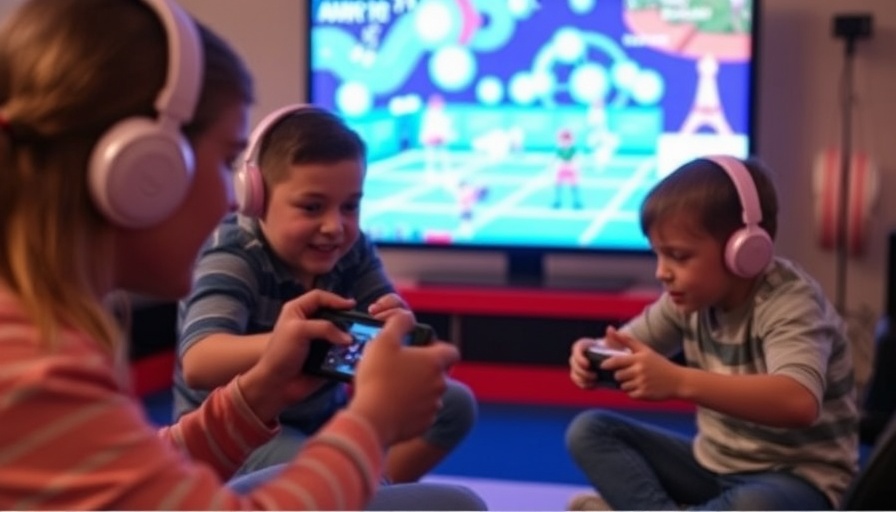
Understanding Gadget Addiction in Children
In today's digital era, gadget addiction among children is an escalating concern. With the potential for excessive screen time to hinder a child's physical, social, emotional, and academic development, it is crucial for parents to recognize the signs early on. Children often turn to gadgets and video games as sources of entertainment, which can quickly spiral into dependency. Studies show that this addiction to screens detracts from physical activity and mitigates opportunities for social interactions that are vital to childhood development.
The Role of Parents: Guardians Against Gadget Dependency
Parents play an indispensable role in combating children's gadget addiction, as they are often the primary influencers in their lives. Engaging children in alternative activities such as sports can significantly reduce the time spent in front of screens. It's important for parents, particularly mothers, who generally take a more proactive stance in managing children's activities, to guide their children toward healthier lifestyle choices that foster physical activity and social engagement.
Sports: A Tool for Balance
Physical activities and sports are instrumental in drawing children away from gadgets. Introducing child-friendly sports not only promotes physical fitness but also encourages social skills, teamwork, and emotional resilience. Parents can explore local community programs or school sports teams to find suitable options that highlight fun and engagement rather than strict competitiveness. This approach can make physical activity enjoyable and less like a chore.
Empowering Parents Through Education
Education is key, and parents should equip themselves with strategies to manage their children's gadget use. Workshops and resources focusing on balanced gadget use, alongside discussions about the physical and emotional impacts of screen time, can empower parents to make informed decisions. By staying aware of technological trends and understanding developmental needs, parents can foster a nurturing environment that prioritizes health and interpersonal relationships.
Creating a Family Plan for Screen Time
Developing a family plan around screen time can help in mitigating gadget addiction. This plan should include designated device-free times, such as during meals or before bedtime, and a shared calendar of scheduled activities that prioritize physical play. Open discussions about the content accessed on gadgets, coupled with setting clear boundaries on screen usage, can significantly enhance a child’s understanding of healthy technology usage.
The Emotional Implications of Gadget Overuse
Understanding the emotional toll of excessive gadget use is critical. Children can experience anxiety, depression, or social isolation as a result of too much screen time. By observing their children’s emotional responses and establishing a strong line of communication, parents can better support their children through these challenges. Encouraging hobbies, fostering friendships, and supporting educational growth through constructive activities can balance out the time spent with gadgets.
Future Predictions: The Role of Tech in Kids' Lives
As technology continues to evolve, the challenge for parents will be to manage their children’s engagement in this digital landscape. Children will inevitably be drawn to the latest gadgets; however, the focus on healthy engagement and moderation is vital. By instilling a solid foundation of balanced habits early on, parents can help ensure their children remain aware of the importance of offline connections and physical health alongside their digital interests.
Encouraging Gadget-Free Events
Organizing gadget-free events can be a fun way to connect with children. Whether it’s a weekend camping trip, a splash pad day, or simply a family game night, these experiences promote bonding and create lasting memories without the interference of technology. They also help instill the value of physical activities and interpersonal relationships in an engaging manner.
Taking Action: Resources for Parents
Parents eager to address gadget addiction can find numerous resources to assist them on this journey. Community centers often facilitate workshops on child development and balanced screen time. Abundant online materials, apps, and platforms exist to guide parents on the best practices for technology use in their families. Joining forums or support groups with other parents can provide insightful perspectives and encouragement.
Final Thoughts and Call to Action
The responsibility lies on parents to foster a generation that thrives both physically and emotionally. Understanding the implications of gadget addiction and engaging in proactive measures can create a more balanced lifestyle for children. Start implementing small changes today by introducing gadget-free time in your family routine or exploring engaging sports options. The journey toward a healthier digital balance begins with you!
 Add Row
Add Row  Add
Add 




Write A Comment